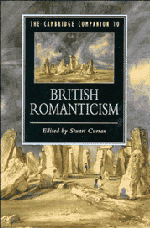Book contents
- Frontmatter
- 1 Romanticism, criticism and theory
- 2 Romanticism and Enlightenment
- 3 Poetry in an age of revolution
- 4 German Romantic Idealism
- 5 Romanticism and language
- 6 Culture's medium
- 7 Romantic Hellenism
- 8 Women readers, women writers
- 9 Romantic fiction
- 10 Romantic poetry
- 11 The sister arts in British Romanticism
- Chronology
- Bibliography
- Index
5 - Romanticism and language
Published online by Cambridge University Press: 28 May 2006
- Frontmatter
- 1 Romanticism, criticism and theory
- 2 Romanticism and Enlightenment
- 3 Poetry in an age of revolution
- 4 German Romantic Idealism
- 5 Romanticism and language
- 6 Culture's medium
- 7 Romantic Hellenism
- 8 Women readers, women writers
- 9 Romantic fiction
- 10 Romantic poetry
- 11 The sister arts in British Romanticism
- Chronology
- Bibliography
- Index
Summary
Questions about linguistic theory have assumed striking prominence in recent work on Romanticism. This is in part because literary criticism over the past two decades, like philosophy for a much longer time, has taken a distinctly linguistic turn. But in addition to the pervasive preoccupation these days with theoretical understandings of the linguistic sign and of verbal representation, more particular circumstances, at least in the United States, have focused attention on Romanticism and language. Romantic texts, most notably Wordsworthian texts, were among the first to be read through the linguistic turnings of poststructuralist criticism in its American guise. Jacques Derrida's extended critique of Rousseau's Essay on the Origin of Languages in Of Grammatology, along with his readings elsewhere of Shelley and other eighteenth- and nineteenth-century writers, have cast an even greater glamor on Romanticism's role in current theory. And since many Romantic texts, verse as well as prose, turn out to contain powerful, agitated broodings on their own status as language, poststructuralist readers have often found their theoretical concerns anticipated, not merely reflected back to them, in Wordsworth or Coleridge or Shelley.
- Type
- Chapter
- Information
- The Cambridge Companion to British Romanticism , pp. 95 - 119Publisher: Cambridge University PressPrint publication year: 1993
- 3
- Cited by



